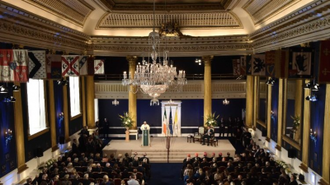Ireland: Pope expresses shame at Church failure to deal with abuse

Pope Francis has said he is ashamed of the Catholic Church's failure to deal properly with the "repellent crimes" of sex abuse by clergy. The subject was raised soon after his arrival in Ireland on Saturday, when he met President Michael D Higgins at Áras an Uachtaráin, the presidential residence, and then had a private meeting with the Taoiseach Leo Varadkar at Dublin Castle.
According to a statement issued after the meeting, President Higgins told Pope Francis of the anger felt by those in Ireland who were abused as children by Catholic clerics. A spokesman said that during the meeting, the President raised with the Pope the "immense suffering and hurt caused by child sex abuse perpetrated by some within the Catholic church." He said Mr Higgins also told Pope Francis of the "anger which had been conveyed to him at what was perceived to be the impunity enjoyed by those who had the responsibility of bringing such abuses for action by the appropriate authorities and have not done so."
The Pope and President agreed on the importance of protecting vulnerable communities and individuals, and discussed other issues including homelessness, health, education and nutrition.
In his speech at Dublin Castle, Mr Varadkar said the past treatment of many women and young people by church and state had left a history of "sorrow and shame". "In place of Christian charity, forgiveness and compassion, far too often there was judgement, severity and cruelty, in particular towards women and children and those on the margins," he said.
"Magdalene Laundries, Mother and Baby Homes, industrial schools, illegal adoptions and clerical child abuse are stains on our State, our society and also the Catholic church.... Wounds are still open and there is much to be done to bring about justice and truth and healing for victims and survivors."
Mr Varadkar appealed to the Pope to use his "office and influence" to ensure abuse survivors receive "justice and truth healing". Mr Varadkar also said he hoped Pope Francis' visit marked a "new chapter" in Ireland's relationship with the Catholic church.
In his address to political leaders, civil society and the diplomatic corps, Pope Frances said people had a right to be outraged at the response of senior figures in the Catholic church to the "repellent crimes" inflicted on young people.
"With regard to the most vulnerable, I cannot fail to acknowledge the grave scandal caused in Ireland by the abuse of young people by members of the church charged with responsibility for their protection and education," he said. "The failure of ecclesiastical authorities - bishops, religious superiors, priests and others - adequately to address these repellent crimes has rightly given rise to outrage and remains a source of pain and shame for the Catholic community. I myself share those sentiments."
However, Pope Francis acknowledged that the Church in Ireland, in the past and present, has played a role in "promoting the welfare of children that cannot be obscured." He hoped that the "gravity of the abuse scandals, which have cast light on the failings of many, will serve to emphasize the importance of the protection of minors and vulnerable adults on the part of society as a whole. In this regard, all of us are aware of how urgent it is to provide our young people with wise guidance and sound values on their journey to maturity."
The Pope said he also wished to acknowledge women who in the past had "endured particularly difficult circumstances."
Pope Francis referred to Pope Benedict XVI's "frank and decisive intervention" pastoral letter to Irish Catholics outlining new measures to counter clerical abuse. He also mentioned his own recent 'Letter to the People of God'* in which he called for greater commitment to "eliminate this scourge in the Church."
Pope Francis also spoke about Northern Ireland, praising those who helped forge the historic Good Friday Agreement signed 20 year ago to bring an end to the long conflict between Protestants and Catholics in Northern Ireland, and hoped for a "future of harmony, reconciliation and mutual trust."
The growth of a materialistic "throwaway culture", the Pope noted, has in fact "made us increasingly indifferent to the poor and to the most defenceless members of our human family, including the unborn, deprived of the very right to life." "Perhaps the most disturbing challenges in this regard today is the massive refugee crisis," the Pope said and called for a wisdom, breadth of vision and humanitarian concern that go far beyond short-term political decisions.
Pope Francis called on the international community to create a global family of nations and peoples with a sense of unity and solidarity, especially with the weakest of our brothers and sisters.
The Holy Father also spoke about the long relationship Ireland has had with the Holy See, and her rich Christian heritage of more than a millennium and a half - mentioning the first preachers Palladius and Patrick, and saints and scholars like Columba, Columbanus, Brigid, Gall, Killian and Brendan.
In the afternoon, Pope Francis prayed at the Candle of Innocence in St Mary's Pro Cathedral. The candle has been burning there permanently since 2011 to remember the survivors of clerical and institutional abuse.
After leaving the cathedral, Pope Francis was greeted by thousands of people gathered along the route his popemobile took through the centre of Dublin to the Capuchin Day Centre which offers support and services to homeless people. The Pope met Brother Kevin Crowley at the centre and thanked him, saying: "The church has real need of this witness." Brother Kevin told him: "Our brothers and sisters who use this centre do so in a spirit of dignity and respect, that same dignity and respect that you love to see in every family."
*See: 'Letter to the People of God' www.indcatholicnews.com/news/35476


















